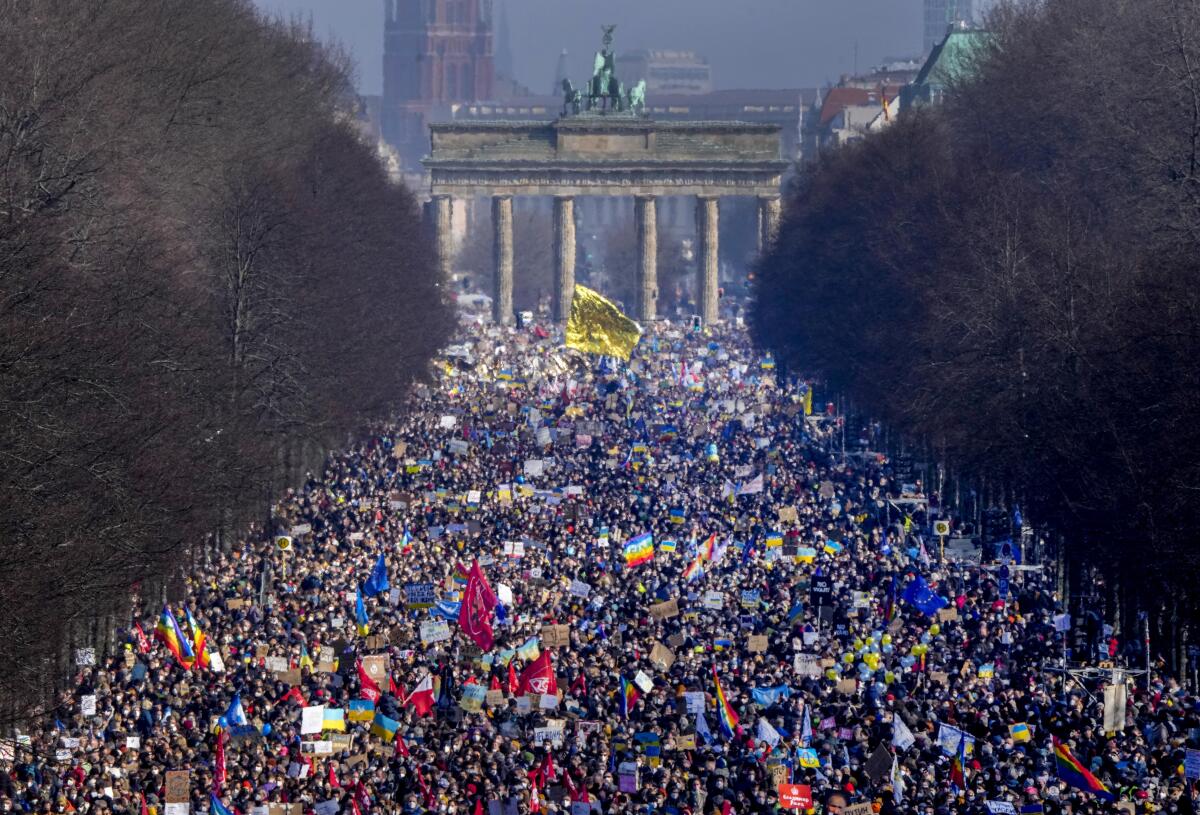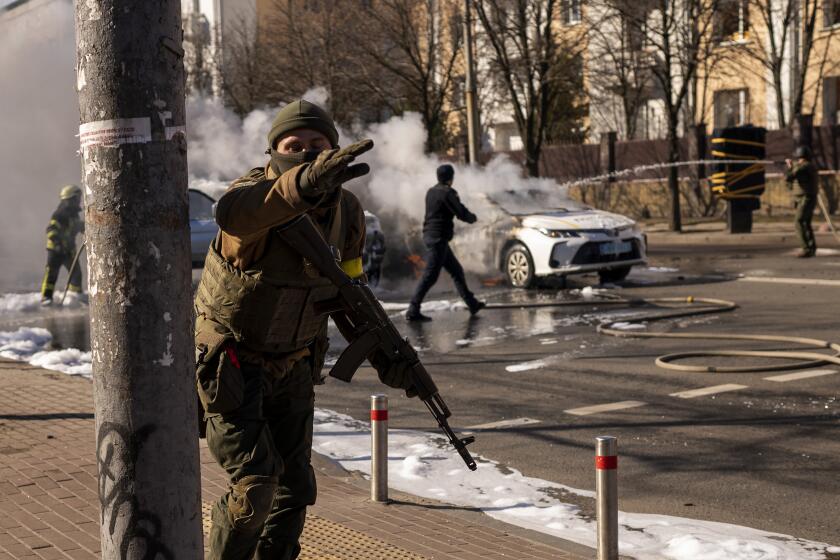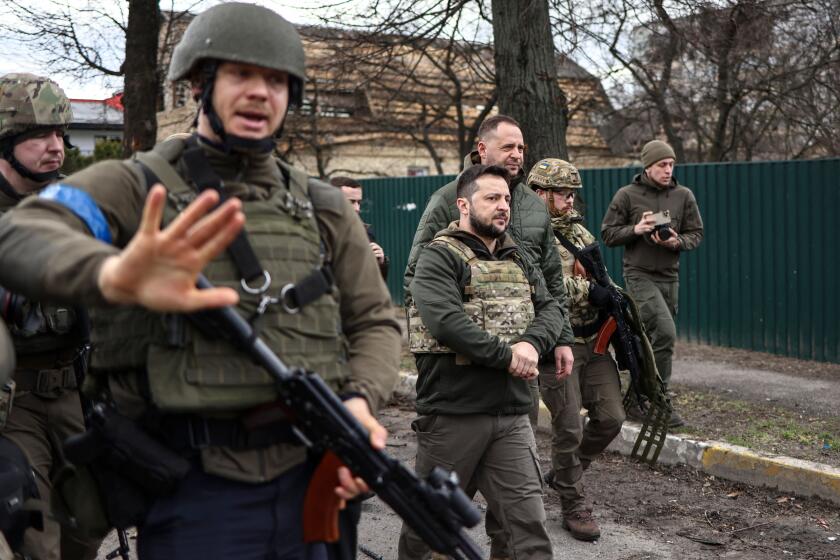Germany shakes off post-World War II timidity to back Ukraine defense against Russia

- Share via
BERLIN — Shocked out of its post-World War II pacifist zeitgeist by Russia’s invasion of Ukraine, Germany was transforming itself with breathtaking speed Sunday to be among the leaders in arming Ukraine with weaponry and boosting its own defense spending.
While more than 100,000 — organizers estimated the crowd at 500,000 — Germans cheered speakers denouncing Russian President Vladimir Putin and his armed forces at a peace rally in the heart of Berlin, Chancellor Olaf Scholz announced stunning plans at the Reichstag less than a mile away to spend an additional 100 billion euros (about $111 billion) for a special fund to re-equip its own military — on top of the 47 billion euros already in this year’s budget.
Increasingly embarrassed by its hesitancy to strongly support Ukraine and break away from its main energy supplier, Russia, the nation with a deep aversion to war following the horrors it inflicted in World War II is now planning to end its historical ban on sending arms into conflict zones.
Scholz said Germany would send 1,000 Panzerfaust 3 antitank weapons and 500 Fliegerfaust 2 antiaircraft Stinger missiles to Ukraine. Germany also said it would finally allow other European countries to immediately send their own supplies of high-tech German-made weapons to Ukraine to aid in defense efforts against Russia.
“The times have changed,” Scholz told a special session of parliament Sunday. “The world is no longer the same. We will have to invest a lot more in our country’s security — to protect our freedom and to protect our democracy.”
Russian troops bear down on Kyiv and continue their thrust into Ukraine’s second-largest city, Kharkiv. Putin puts nuclear forces on alert.
With its close business ties to Russia — and dependence on Russia for more than half of its natural gas supplies — Germany had come under increasing criticism from its European Union and NATO partners for dragging its feet on sending arms to help Ukraine defend itself. It had also been reticent in agreeing to tough economic sanctions, such as barring Russian banks from the SWIFT system of international payments.
Scholz, who succeeded Chancellor Angela Merkel just two months ago, finally dropped the refusal to export arms to Ukraine on Saturday — before that, Germany declined to send any supplies other than 5,000 helmets.
Scholz opened the floodgates further Sunday with the surprise announcement that Germany would immediately raise its defense spending to the 2% of gross domestic product (GDP) promised to NATO partners in 2014 from 1.4% currently — after declaring for the last eight years that was not possible.
American presidents past and present, as well as NATO partners, had long pleaded that Germany spend a far larger share of its GDP on defense. Instead, Germany’s underfunded Bundeswehr has been plagued by parts shortages that have grounded most of the fighter jets in its air force and many of its tanks.
A woman reacts as she stands in front of a house burning after being shelled in the city of Irpin.
“The German government just did a 180-degree turn right before our eyes,” said Thomas Jaeger, a political scientist at Cologne University, in an interview. “It’s remarkable to see the speed of the sea change on defense spending and towards arms exports into conflict zones.”
The chief of the German army acknowledged last week that the Bundeswehr was ill-equipped for a war in Europe that he, like millions of others in Germany, never thought was possible until Russia’s unprovoked strike on its neighbor. “The Bundeswehr is standing there more or less empty-handed,” Lt. Gen. Alfons Mais wrote in comments on social media.
“For the first time since the end of the Cold War, it’s dawning on everyone that the country has an army that probably wouldn’t be able to protect them,” Jaeger said. “It was long so much easier and popular for elected officials to resist spending on defense. That’s all changing fast right now.”
Julius van de Laar, a political analyst in Berlin, said Germany had been under massive pressure from the rest of the EU to take tougher steps against Russia, even though it would mean putting aside its deeply pacifist leanings and the ghosts of its Nazi past.
Germany’s knotty reasoning in thwarting the EU from banning Russia from the SWIFT international banking system last week triggered a strong reaction against Berlin this weekend.
“Germany has been pushed into taking these steps by a surprisingly united EU,” said Van de Laar. “If we’re honest, Germany has been a laggard for decades on defense. And everyone has been telling Germany to stop being dependent on Russian gas. It’s late in the game but at least Germany moved in the right direction.”
At the peace rally in Berlin, most of the speakers and participants expressed relief that Germany was finally jumping over its shadow and strongly contributing to Ukraine’s defense.
“We’re here to show solidarity for Ukraine and we hope we can have a positive effect on ending the war,” said Marc Ahner, a 46-year-old jazz singer holding a sign calling for Putin to be jailed for war crimes. “I don’t think Putin will be intimidated by us. But it’s still important that we’re all here standing up for Ukraine and hopefully he’ll see all that support.”
Ahner added that, like many Germans, he was torn apart by the question of whether Germany, which was responsible for so much death and destruction during World War II, should be involved in sending weapons.
“It’s a horrible bind for us to be in,” he said. “I really don’t know what is worse — to be accused of not helping Ukraine by not sending weapons or to be sending weapons into a war zone. But it’s probably the lesser of two evils.”
Hartmut Kramer, a pensioner in Berlin who was born in 1944, near the end of World War II, said he has been taking part in peace marches for decades and opposed the stationing of U.S. nuclear weapons in West Germany during the Cold War. But he said Germany has no choice now.
“I’m always against weapons,” said Kramer, who as a 1-year-old in Upper Silesia, now part of Poland, was among those fleeing an invading Russian army. “I’ve always believed in the peace movement. But nothing justifies what Putin is doing. It’s with a heavy heart that I would say sometimes there’s no other choice but to send weapons.”
More to Read
Sign up for Essential California
The most important California stories and recommendations in your inbox every morning.
You may occasionally receive promotional content from the Los Angeles Times.















